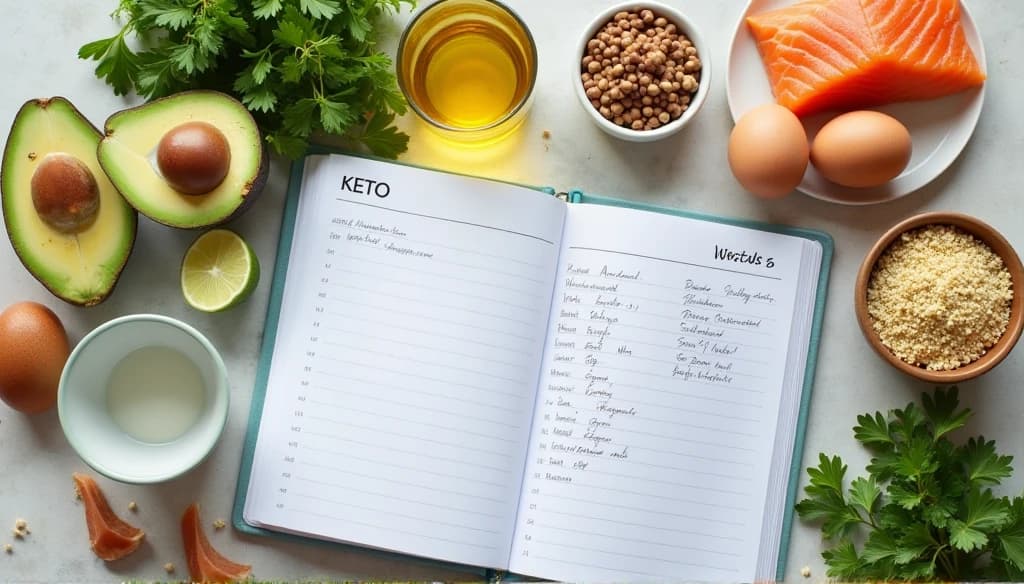Table of Contents
TogglePicture this: You’ve just had your baby, and you’re feeling the pressure to shed the extra pregnancy weight. Naturally, you start looking for effective diets, and the ketogenic diet catches your eye. But then the questions start swirling: “Can I do keto while breastfeeding?” or “Can you do keto while breastfeeding safely?” You’re not alone—many moms are curious about this, and the answers might surprise you.
In this article, we’ll break down everything you need to know about keto while breastfeeding, including the benefits, potential risks, and how to do it safely. Let’s dive in!
What Is the Keto Diet?
The ketogenic diet, or keto, is a low-carbohydrate, high-fat diet designed to shift your body into a state called ketosis, where fat becomes the primary energy source instead of carbohydrates. By drastically reducing carb intake (usually to 20-50 grams per day), your body begins to burn fat for fuel, producing compounds called ketones.
While keto is highly effective for weight loss and improving metabolic health, it’s not a one-size-fits-all approach—especially for breastfeeding moms.
Can I Do Keto While Breastfeeding?

Yes, you can do keto while breastfeeding, but it requires careful planning and monitoring. Breastfeeding places unique nutritional demands on your body, and adopting a keto diet without precautions may lead to issues such as reduced milk supply or nutrient deficiencies.
Here’s the key: It’s crucial to modify the standard keto approach to ensure you and your baby get the nutrients you need.
Benefits of Keto While Breastfeeding

1. Postpartum Weight Loss
One of the main reasons moms consider keto is for rapid weight loss. Being in ketosis helps burn fat efficiently, which can help you shed the baby weight.
2. Improved Energy Levels
Many moms report feeling more energetic on keto. The stable blood sugar levels associated with low-carb diets can prevent energy crashes and fatigue, which are common during postpartum.
3. Reduced Sugar Cravings
Breastfeeding often triggers sugar cravings due to hormonal changes. Keto’s focus on high-fat, low-carb foods can help curb these cravings and stabilize hunger hormones.
4. Anti-Inflammatory Effects
The keto diet has anti-inflammatory properties, which may help alleviate postpartum inflammation or discomfort.
Why Moms Are Turning to Keto While Breastfeeding: A Game-Changer?

It’s no secret that new moms often feel a blend of excitement, exhaustion, and pressure—especially when it comes to their bodies. You’ve just brought a beautiful life into the world, but now you’re navigating sleepless nights, hormonal changes, and the lingering effects of pregnancy weight gain. This is where keto has become a game-changer for many breastfeeding moms.
Unlike traditional diets that demand calorie counting and constant hunger, keto offers a more sustainable and satisfying approach. Imagine eating rich, creamy avocado slices, delicious grilled salmon, or even guilt-free chocolate squares, all while burning fat and shedding those extra pounds. For many moms, keto isn’t just a diet—it’s a lifestyle that helps them feel in control again after months of focusing solely on their baby.
But here’s the kicker: Keto doesn’t just help with weight loss. Many moms report that the stable blood sugar levels from a low-carb, high-fat diet reduce their cravings for sugary snacks (a common struggle during postpartum). Plus, the energy boost from ketosis can be a lifesaver when you’re running on little sleep and long nights with a newborn.
Even better, keto’s anti-inflammatory benefits may help ease postpartum aches and pains, while the mental clarity associated with ketosis can improve focus and mood—a major blessing for moms juggling endless responsibilities.
However, every mom’s body is different, and what works for one may not work for another. The key is to listen to your body, stay mindful of your milk supply, and make adjustments as needed. Keto isn’t a shortcut but a tool that, when used wisely, can empower you to feel your best while giving your baby the nourishment they need.
Potential Risks of Keto While Breastfeeding

1. Keto Flu
When transitioning to keto, your body may experience flu-like symptoms such as headaches, fatigue, and muscle cramps. This can be especially challenging for breastfeeding moms who are already dealing with postpartum exhaustion.
2. Dehydration
Keto can cause increased water loss, leading to dehydration—a major concern for breastfeeding mothers who need extra fluids to maintain milk supply.
3. Reduced Milk Supply
Carbohydrates play a role in milk production. A drastic reduction in carbs may lead to a decrease in milk supply, especially if calorie intake is too low.
4. Nutrient Deficiencies
Breastfeeding depletes nutrients like calcium, magnesium, and B vitamins. Without proper planning, a keto diet may not provide enough of these vital nutrients.
How to Do Keto Safely While Breastfeeding

1. Don’t Cut Carbs Too Low
While traditional keto recommends 20-50 grams of carbs per day, breastfeeding moms should aim for 50-100 grams of carbs daily. This provides enough energy for milk production while still promoting fat-burning.
2. Prioritize Whole, Nutrient-Dense Foods
Focus on foods rich in essential nutrients:
- Healthy Fats: Avocado, olive oil, nuts, seeds, and fatty fish.
- High-Quality Protein: Eggs, chicken, beef, and tofu.
- Low-Carb Vegetables: Spinach, kale, broccoli, and zucchini.
- Complex Carbs: Sweet potatoes, quinoa, and oats (in moderation).
3. Stay Hydrated
Breastfeeding increases your fluid needs. Aim to drink at least 12-16 cups of water daily to prevent dehydration and maintain milk supply.
4. Monitor Your Milk Supply
Pay close attention to your baby’s feeding patterns and weight gain. If your milk supply drops, consider increasing your carb intake slightly or consulting a lactation specialist.
5. Supplement Wisely
To fill potential nutrient gaps, consider taking:
- Prenatal vitamins
- Electrolytes (sodium, potassium, magnesium)
- Omega-3 fatty acids
Sample Meal Plan for Keto While Breastfeeding
| Meal | Food Options | Carbs (Approx.) |
|---|---|---|
| Breakfast | Scrambled eggs with spinach and avocado; side of berries | 15g |
| Snack | Handful of almonds and a slice of cheddar cheese | 5g |
| Lunch | Grilled chicken salad with olive oil dressing, cucumbers, and feta | 10g |
| Snack | Greek yogurt (unsweetened) with a sprinkle of chia seeds | 10g |
| Dinner | Baked salmon with roasted asparagus and a small serving of mashed cauliflower | 10g |
| Dessert | A few dark chocolate squares (70% cocoa or higher) | 10g |
| Daily Total | ~50-60g |
Final Thoughts: Can You Do Keto While Breastfeeding?
So, can you do keto while breastfeeding? The answer is yes, but only if it’s done mindfully. The key is to modify the diet to meet your unique needs as a nursing mom. By consuming enough calories, staying hydrated, and including moderate carbs, you can enjoy the benefits of keto while ensuring your baby’s health and milk supply are not compromised.
Always consult a healthcare provider or lactation consultant before starting keto while breastfeeding. Your health and your baby’s health come first!
Have you tried keto while breastfeeding? Share your experiences or questions below!
FAQ: Common Questions About Keto While Breastfeeding
Will keto affect my milk supply?
It can if your carb or calorie intake is too low. To avoid this, aim for at least 50-100 grams of carbs daily and eat enough calories.
How many calories should I eat on keto while breastfeeding?
Breastfeeding moms need extra calories—usually 2,000-2,500 calories per day. Adjust based on your activity level and milk production.
Can keto help with postpartum depression?
Some studies suggest that keto’s balanced blood sugar levels and anti-inflammatory effects may improve mood, but more research is needed. Always consult your doctor.
Can I do intermittent fasting with keto while breastfeeding?
Intermittent fasting is not recommended during breastfeeding as it may reduce calorie intake and milk supply. Focus on eating regular, nutrient-dense meals.
What are the signs that keto isn’t working for me while breastfeeding?
Signs include fatigue, irritability, significant drop in milk supply, or poor weight gain in your baby. If you experience any of these, adjust your diet or consult a healthcare provider.





